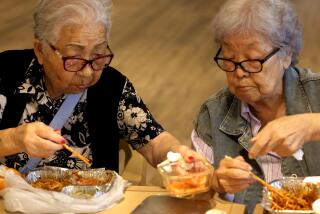Slain hotel manager in Little Tokyo had ‘huge heart’
- Share via
She collected old bottles for recycling and used the dollars earned to help the homeless on skid row. She was so devoted to her job that she declined her daughter’s offers for vacations in Hawaii. But the one pastime she couldn’t resist was watching Los Angeles Lakers games.
That portrait of Hideko Oyama, a 74-year-old Japanese immigrant and manager of Little Tokyo’s Chetwood Hotel who became the year’s first homicide victim in downtown Los Angeles, emerged Thursday as authorities filed murder and attempted robbery charges against a Chinese man for the Jan. 5 crime.
Jian Hong Li, a 39-year-old Hong Kong native who had lived for about a month at the Chetwood Hotel, was arrested Wednesday after a weeklong manhunt that took police detectives from skid row to Camarillo before he was finally tracked down at 1st and Boyle streets in East Los Angeles. Li allegedly attacked Oyama with a meat cleaver during an attempted robbery, according to the felony complaint. Bail was set at $1 million.
The murder of an elderly woman in a neighborhood generally free of violent crime shook the Little Tokyo community. The last murder in the neighborhood took place in the 1970s.
“I am elated and relieved this man is off the streets and caught,” said Oyama’s daughter, June Oyama Lowry.
A tearful Lowry appeared at a news conference Thursday in front of the Chetwood Hotel with Los Angeles police and City Councilwoman Jan Perry, who represents the district.
In an interview Wednesday, Lt. Paul Vernon, commanding officer of the downtown detective division, described Li as an “inveterate gambler” and “roustabout” who went from job to job, mostly at Chinese restaurants. Li arrived legally in the United States about a decade ago and has no criminal record, Vernon said.
Vernon said detectives were able to “compare, confirm and tie forensic evidence” to Li’s presence at the crime scene but declined to provide details.
Lowry, a Newbury Park resident, said her mother struggled with family and financial hardship throughout her life but always maintained her humor, spunk and diligent work ethic. Oyama immigrated to the United States in 1968 with her daughter and Chinese husband against her parents’ wishes, Lowry said.
A few years later, Lowry said, her father began drinking heavily and started to physically and verbally abuse her mother. Her parents divorced, leaving Oyama alone to raise her daughter and son, who has cerebral palsy, Lowry said.
To make ends meet, Oyama worked as a waitress, pickled vegetable vendor and manager of hotels catering to Japanese students and tourists on the edge of Little Tokyo and downtown’s warehouse district. Oyama saw herself as a substitute mother and friend for the rootless young Japanese and was devoted to them and her disabled son, whom she brought to the beach every Sunday, Lowry said.
“She had a huge heart -- she knew what it was like to be alone,” Lowry said. “She felt so needed by them.”
More to Read
Sign up for Essential California
The most important California stories and recommendations in your inbox every morning.
You may occasionally receive promotional content from the Los Angeles Times.














